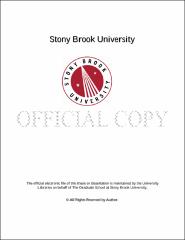| dc.identifier.uri | http://hdl.handle.net/11401/77593 | |
| dc.description.sponsorship | This work is sponsored by the Stony Brook University Graduate School in compliance with the requirements for completion of degree. | en_US |
| dc.format | Monograph | |
| dc.format.medium | Electronic Resource | en_US |
| dc.language.iso | en_US | |
| dc.publisher | The Graduate School, Stony Brook University: Stony Brook, NY. | |
| dc.type | Dissertation | |
| dcterms.abstract | Recent research from our laboratory demonstrated that collaboration has a positive impact on knowledge retrieval—increasing accuracy, reducing omissions and errors—highlighting the error pruning mechanisms of group discussion. The present experiments put the error pruning mechanisms of collaboration to test by investigating how collaborative discussion influences the transmission of misinformation introduced via fictional story reading. Given the positive impact of collaborative discussion on knowledge retrieval, we expected that collaboration would reduce the negative effects of misinformation exposure. In two experiments, participants completed three general knowledge tests in one of the following sequences: individually, collaboratively, and then individually (I-C-I), or in three successive individual tests (I-I-I). The timing of collaboration relative to misinformation exposure varied: in Experiment 1, misinformation exposure occurred before the second test, while in Experiment 2, it occurred after. Consistent with previous findings, both experiments demonstrated that reading misinformation reduced correct responding and increased misinformation production, and this outcome was particularly salient for participants who completed repeated individual tests. Although participants who worked collaboratively also experienced some of the negative effects of misinformation, there were benefits associated with collaboration; I-C-I participants outperformed those that worked individually and were more confident in their responses. Moreover, on questions for which participants demonstrated accurate prior knowledge, a significant reduction in correct responses was observed only for participants who repeatedly worked individually. Together, these experiments show that although collaborative discussion did not eliminate the transmission of misinformation, it significantly reduced its impact. | |
| dcterms.abstract | Recent research from our laboratory demonstrated that collaboration has a positive impact on knowledge retrieval—increasing accuracy, reducing omissions and errors—highlighting the error pruning mechanisms of group discussion. The present experiments put the error pruning mechanisms of collaboration to test by investigating how collaborative discussion influences the transmission of misinformation introduced via fictional story reading. Given the positive impact of collaborative discussion on knowledge retrieval, we expected that collaboration would reduce the negative effects of misinformation exposure. In two experiments, participants completed three general knowledge tests in one of the following sequences: individually, collaboratively, and then individually (I-C-I), or in three successive individual tests (I-I-I). The timing of collaboration relative to misinformation exposure varied: in Experiment 1, misinformation exposure occurred before the second test, while in Experiment 2, it occurred after. Consistent with previous findings, both experiments demonstrated that reading misinformation reduced correct responding and increased misinformation production, and this outcome was particularly salient for participants who completed repeated individual tests. Although participants who worked collaboratively also experienced some of the negative effects of misinformation, there were benefits associated with collaboration; I-C-I participants outperformed those that worked individually and were more confident in their responses. Moreover, on questions for which participants demonstrated accurate prior knowledge, a significant reduction in correct responses was observed only for participants who repeatedly worked individually. Together, these experiments show that although collaborative discussion did not eliminate the transmission of misinformation, it significantly reduced its impact. | |
| dcterms.available | 2017-09-20T16:52:57Z | |
| dcterms.contributor | Rajaram, Suparna | en_US |
| dcterms.contributor | Luhmann, Christian | en_US |
| dcterms.contributor | London, Bonita | en_US |
| dcterms.contributor | Marsh, Elizabeth. | en_US |
| dcterms.creator | Pociask, Sarah Elyse | |
| dcterms.dateAccepted | 2017-09-20T16:52:57Z | |
| dcterms.dateSubmitted | 2017-09-20T16:52:57Z | |
| dcterms.description | Department of Experimental Psychology. | en_US |
| dcterms.extent | 104 pg. | en_US |
| dcterms.format | Application/PDF | en_US |
| dcterms.format | Monograph | |
| dcterms.identifier | http://hdl.handle.net/11401/77593 | |
| dcterms.issued | 2015-05-01 | |
| dcterms.language | en_US | |
| dcterms.provenance | Made available in DSpace on 2017-09-20T16:52:57Z (GMT). No. of bitstreams: 1
Pociask_grad.sunysb_0771E_12476.pdf: 899394 bytes, checksum: 613faf5dd613b636be76be26f0ccfb63 (MD5)
Previous issue date: 2015 | en |
| dcterms.publisher | The Graduate School, Stony Brook University: Stony Brook, NY. | |
| dcterms.subject | Psychology | |
| dcterms.subject | collaboration, general knowledge, misinformation, retrieval | |
| dcterms.title | The Effects of Collaborative Discussion and Exposure to Misinformation on the Retrieval of General Knowledge | |
| dcterms.type | Dissertation | |

